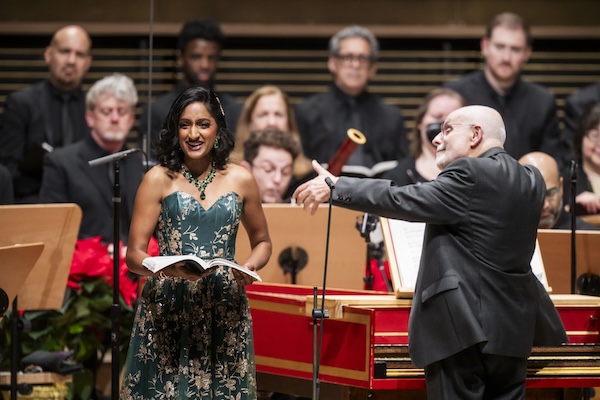Koopman’s silvery “Messiah” lights up a Philharmonic Christmas tradition

Holiday traditions have to stay the same from year to year, right? That’s why they’re traditions. But this is New York, where same-old doesn’t cut it.
So if one of your December traditions is to hear Handel’s Messiah performed by the New York Philharmonic, it is guaranteed not to be the same as last year, or the year before. That’s because, in recent years at least, the orchestra hasn’t engaged the same soloists, chorus or (most importantly) conductor for Messiah two years in a row.
For the podium role, the Philharmonic usually seeks out someone distinguished in the field of 18th-century music, and few conductors fill that bill like Ton Koopman, who is leading this week’s performances of Messiah with the Musica Sacra chorus and a quartet of capable soloists.
For half a century, the Dutch conductor and organist has been a leading light of the “historically informed” performance movement that has radically changed the way traditional symphony orchestras play 18th-century music. So it was not exactly a surprise, in Thursday’s performance, to hear the Philharmonic string sections produce that silvery, vibratoless antique sound on their modern instruments.
And few listeners today would cavil at the lean forces and fleet tempos now favored for Baroque music, so different from the ponderous, upholstered performances of yesteryear. Still, Koopman’s light-fantastic treatment of favorite choruses such as “And the glory of the Lord” and “Lift up your heads, O ye gates” was still a wake-up call.
And while the brilliant “Hallelujah!” chorus was as much of a show-stopper as ever, it felt faintly ridiculous to follow tradition and rise to one’s feet for a performance so cheerful and unpretentious.
The octogenarian conductor stood at his harpsichord throughout the performance’s two hours, directing with crisp gestures, and sitting only occasionally to reinforce a basso continuo with his instrument. Although the composer and the librettist divided Messiah into three parts, Koopman conducted the piece straight through, with a single intermission at about the halfway point, after the chorus “All we like sheep have gone astray”—that is, three numbers into Part II, and a bit of a cliff-hanger for those errant sheep.
The international group of soloists, all making their Philharmonic debuts, gave strong performances. Kieran White’s warm, moldable tenor glowed in the opening recitative “Comfort ye my people.” The proclamation “Ev’ry valley shall be exalted” could have been more trumpet-like, but White smartly delivered the fast melismas.
Countertenor Maarten Engeltjes‘s pure tone distinguished “But who shall abide” but lacked the wattage to put across the bravura melismas of “For He is like a refiner’s fire.” Later, his finely sustained line gave poignancy to “He was despised.”
Soprano Maya Kherani stood out not just for the number and variety of her recitatives and airs, but for her creamy tone in all registers and her agility in leaps and passagework. A graceful “How beautiful are the feet,” a floating “I know that my Redeemer liveth,” and a fast, brilliant “Rejoice greatly” with swirling cadenza were some of her high points.
The veteran bass-baritone Klaus Mertens brought narrative heft to “Thus saith the Lord” and dark and light vocal timbres to match the text in “The people that walked in darkness.” His performance of “Why do the nations so furiously rage together” was vigorous, if a little nose-in-book.
But the true glory of Messiah is the choruses, and the 40 singers of Musica Sacra, directed by Kent Tritle, were marvelously up to the job on Thursday, beginning with a crisp, strutting “And the glory of the Lord” and a swift “For unto us a Child is born” with glittering melismas. Intonation was first-rate, from difficult high entrances to richly blended chords. There were vivid characterizations too, from those silly wandering sheep to the mocking crowd at the Crucifixion in “He trusted in God.”
One ended up wishing all the great musical works had holiday traditions associated with them, so it would be our duty to encounter them anew every year. Handel’s masterpiece can take the scrutiny. As long as there are imaginative performers and eager listeners, Messiah shall reign for ever and ever.
Messiah will be repeated 2 p.m. Friday and Saturday. nyphil.org